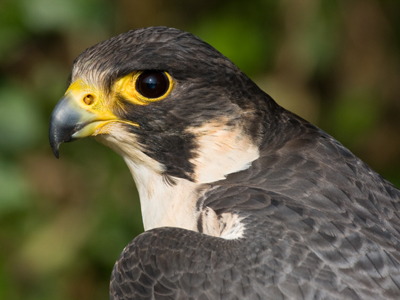
A peregrine falcon can fly at 90 km/h but can dive on its prey at much greater speeds.
Speed 02
Revise what you know about the speed at which things travel. What is the fastest bird?
Studying in years 7, 8 or 9? Enjoy learning by playing quizzes.
Scroll down to play the quiz
1 .
A car travels at 40 mph for 60 minutes. How far does it go?
40 kilometres
40 miles
60 miles
240 miles
60 minutes = 1 hour, so distance = 40 mph x 1 h = 40 miles
2 .
A cyclist has a speed of 10 km/h. She cycles for 120 minutes - how far does she go?
10 kilometres
12 kilometres
20 kilometres
1,200 kilometres
120 minutes = 2 hours, so distance = 10 km/h x 2 h = 20 km
3 .
If a peregrine falcon flies at 90 km/h, how far could it fly in 20 minutes?
4.5 kilometres
18 kilometres
30 kilometres
1,800 kilometres
20 minutes = 20/60 = 1/3 hour, so distance = 1/3 h x 90 km/h = 30 km
4 .
If time is measured in hours, speed in mph, distance .......
is in centimetres
is in metres
is in kilometres
is in miles
Professional scientists would never use mph as a measure for speed in their experiments
5 .
If time is measured in seconds, speed in m/s, distance .......
is in centimetres
is in metres
is in kilometres
is in miles
This is the basic SI unit of distance
6 .
An athlete runs at 8 m/s for 1 minute. How far do they go?
48m
80m
480m
4.8km
1 minute = 60 seconds, so distance = 8 m/s x 60 s = 480 m
7 .
A cyclist has a speed of 10 km/h. She cycles for 2 hours - how far does she go?
5 kilometres
12 kilometres
20 kilometres
25 kilometres
Distance = 10 km/h x 2 h = 20 kilometres
8 .
A dog runs at 15 m/s for 30 seconds. How far does it travel?
45m
450m
2km
4.5km
15 m/s x 30 s = 450 m
9 .
If time is measured in hours, speed in km/h, distance .......
is in centimetres
is in metres
is in kilometres
is in miles
You don't always need to express distance in metres per second, in fact it can sometimes be more helpful to know speeds in more familiar everyday units like km/h
10 .
A car travels at 50 mph for 2 hours. How far does it go?
10 miles
50 miles
100 miles
100 kilometres
Distance = 50 mph x 2 h = 100 miles
**Unlimited Quizzes Await You! 🚀**
Hey there, quiz champ! 🌟 You've already tackled today's free questions.
Ready for more?
Ready for more?
🔓 Unlock UNLIMITED Quizzes and challenge yourself every day. But that's
not all...
not all...
🔥 As a Subscriber you can join our thrilling "Daily Streak" against other
quizzers. Try to win a coveted spot on our Hall of Fame Page.
quizzers. Try to win a coveted spot on our Hall of Fame Page.
Don't miss out! Join us now and keep the fun rolling. 🎉
**Unlimited Quizzes Await You! 🚀**
Hey there, quiz champ! 🌟 You've already tackled today's free questions. Ready for more?
🔓 Unlock UNLIMITED Quizzes and challenge yourself every day. But that's not all...
🔥 As a Subscriber you can join our thrilling "Daily Streak" against other quizzers. Try to win a coveted spot on our Hall of Fame Page.
Don't miss out! Join us now and keep the fun rolling. 🎉







